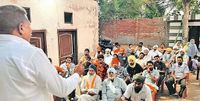In a significant shift aimed at enhancing transparency within the Mahatma Gandhi National Rural Employment Guarantee Act (MGNREGA), attendance for workers will now be recorded using a mobile application. This initiative, announced in Almora, will utilize the National Mobile Monitoring System (NMMS) software, allowing Panchayat representatives to log the attendance of more than ten workers simultaneously.
The government’s decision to implement this mobile attendance system is part of broader efforts to increase transparency in MGNREGA operations. The app will not only track attendance but also provide comprehensive details about the workers and their assigned tasks.
Meanwhile, in a related development, a meeting of the Dehati Mazdoor Sabha, held in Bhikhiwind, highlighted pressing demands from local laborers. Presided over by Gurbir Bhatti, the meeting saw a significant turnout of both male and female workers, who voiced their need for year-round employment under MGNREGA and a daily wage increase to Rs 700. District Secretary Chaman Lal Darajke and leaders Jaswant Singh and Lajar Lakhan emphasized the urgency of these demands.
In another instance, the beautification project of a pond in the Chakhan Mohammad village of Uttar Pradesh has come to a standstill due to a labor shortage. Approved under MGNREGA, the project had an allocation of approximately 18 lakh rupees, but work halted after initial progress was disrupted by rains. Currently, about nine lakh rupees in wages remain unpaid, leaving 315 laborers inactive as many have begun migrating towards cities in search of immediate payment.
Ajay Kumar Nishad, the village head, confirmed that while the beautification project has funding approved, the ongoing wage arrears are deterring workers from participating. This situation underscores the larger issue of delayed payments that many MGNREGA workers face, impacting their livelihoods significantly.
On a national level, the Parliamentary Standing Committee on Rural Development and Panchayati Raj has called for essential reforms in MGNREGA. Chaired by Congress MP Saptagiri Shankar Ulaka, the committee recommended increasing the number of working days under the scheme from 100 to 150 and raising the minimum wage to Rs 400. These adjustments aim to better align wages with the rising cost of living and to ensure that workers can meet their basic needs.
The committee also proposed extending the working days from 150 to 200 for disaster and drought relief provisions, as well as increasing the limit of workdays under the Forest Rights Act for vulnerable communities. This reflects an understanding of the evolving challenges that rural laborers face, particularly in light of climate change and economic pressures.
Moreover, the committee stressed the importance of social audits to ensure accountability within the scheme. They raised concerns over the mandatory implementation of the Aadhaar Based Payment System (ABPS) starting January 1, 2024, arguing that such a requirement is premature given the unresolved issues surrounding Aadhaar seeding. This has led to many laborers being excluded from the payment system.
In light of these challenges, the committee has recommended conducting independent and transparent surveys across the country to identify shortcomings in MGNREGA and to implement necessary reforms. This initiative aligns with findings from the Institute of Economic Growth, which recently recognized MGNREGA as one of the most reliable programs established since India's independence.
The current state of MGNREGA reflects a critical juncture for rural employment in India. While the introduction of mobile attendance tracking may enhance operational transparency, the persistent issues of wage delays and labor shortages remain significant hurdles. As laborers continue to advocate for better wages and consistent work, the government’s response to these demands will be pivotal in shaping the future of rural employment.
As the situation unfolds, it will be crucial to monitor how these reforms and technological implementations impact the livelihoods of millions of rural workers who rely on MGNREGA for their daily sustenance.



